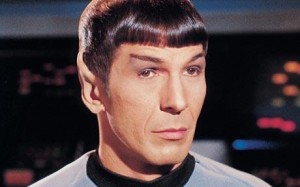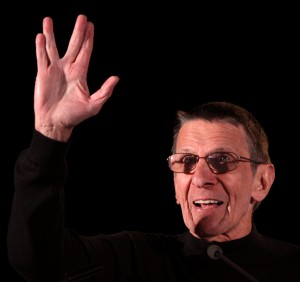By now you’ve read one of the many tributes to Leonard Nimoy, the actor who was best known for the role of Spock in Star Trek
for nearly fifty years. There’s not much more I can say here to add to the great tributes. Living in the age of the Internet, it has become a tradition for dozens of pieces to pop up within hours of the announcement of a celebrity’s death. These pieces talk about how much the actor’s most important roles meant to us personally, how they changed our lives, etc. Nimoy’s death is no different. Already, I’ve had the pleasure of reading pieces about the Jewish origins of the famous Vulcan salute, Nimoy’s own advice to a biracial child in the late 1960s, the ways in which Trek and other television shows became useful fodder for cultural studies
, and his standing up for fellow cast member Nichelle Nichols to be paid equally to everyone else.
Spock’s importance to the Trek mythos is unmistakable. His character was the first of several characters in Star Trek used to explore the human condition. Data in The Next Generation, Odo in Deep Space Nine, Seven of Nine and The Doctor in Voyager, T’Pol in Enterprise: all these characters are just different incarnations of Spock, the outsider struggling to understand humanity. He was the consummate outsider to the rest of the Enterprise crew. In a sense, we could all relate to Spock. When have you felt  misunderstood, alone, or isolated? Or have you ever experienced being stuck between two worlds, two cultures, two distinct ways of thinking? In that case you were, for a moment, Spock.
misunderstood, alone, or isolated? Or have you ever experienced being stuck between two worlds, two cultures, two distinct ways of thinking? In that case you were, for a moment, Spock.
. The impact of Star Trek on American culture, and what it says about American culture, has been written about at length. Reactions to Nimoy’s death have proven to be another example of that impact. In that sense, Nimoy’s death allows for a larger reflection on how intellectual and cultural historians should research and write about “the American mind” since the 1960s. When the President of the United States feels compelled to write a tribute to a celebrity that should tell you about the importance about said celebrity to national culture. The ways Trek served as a clearinghouse for stories relating to real world experience enabled it to become a cultural touchstone. It’s been said before, but it’s worth repeating: Star Trek in the late 1960s was a place where issues of racism, the Vietnam War, and the Cold War were dealt with alongside transporters and phaser fights.
Many of my closest friends in the historical profession are also Star Trek fans. Perhaps it’s because the various television shows and movies offer a reflection of the best qualities of exploration: a seeking of the truth, a fascination with discovery, the thrill of knowing something that no one else knows, and a yearning to tell everyone else about that “something.” And as historians, we consider ourselves to be explorers of the past. Or, well, maybe so many historians like Trek because it allows us an escape from both the past and the present (and consider all the times Trek has offered trenchant critiques of modern society, whether through allegory or time travel).
I don’t want to get too personal on this blog, but most of my Twitter followers and Facebook friends know me as a Trek fan. I was not surprised by Nimoy’s death—I knew he had been admitted to the hospital earlier in the week—but I was deeply saddened by it in a way I’m not when it comes to most celebrity deaths. Celebrity deaths aren’t quite the same as a death in the family or losing a close friend, or even experiencing the death of a personal mentor. They’re different for two reasons: most of us never get to meet the celebrity personally, and at the same time the mourning is never completely done in a bubble. Friday I kept cringing every time I surfed the web, because it seemed another tribute to Nimoy was just a click or scroll down away. I wanted to be away from the tributes. However, it was also comforting to know so many folks cared about Nimoy and acknowledged his importance to their lives.
When the first cultural and intellectual histories of the early twenty-first century are written, space will have to be made for the use of the web in commemorating death. DeForest Kelley (Leonard “Bones” McCoy on Star Trek) died in 1999, and James Doohan (Scotty) passed away in 2005, both before social media exploded on the web. Trek fans talked about their deaths in message boards and read the obits in their local newspapers, but we didn’t have anything like Twitter or Facebook with which to commemorate the lives of our favorite actors. We’ve had this for under a decade now, and the pattern always repeats itself. It’s a comforting pattern though, a reminder that celebrities mean more to us than simply seeing them on television or film, hearing them sing or speak. Leonard Nimoy, and his most famous role as Spock, invited us to think about what it means to be an outsider, to be misunderstood. In short, Spock invited us to reconsider what it meant to be human.
For a young kid growing up in the early 1990s who was not athletic, shy around others, and often quiet at school, Spock was a hero. Spock was heroic for me because he used his brain—and was valued for it. It’s easy to talk about Americans being anti-intellectual, but characters like Spock provide the opportunity to think about how brainy fictional figures are also important in American cultural history. Leonard Nimoy inspired many boys and girls, men and women, to embrace cultural diversity. It would be trite for me to say that Nimoy’s life and career were “fascinating”….except both were.

9 Thoughts on this Post
S-USIH Comment Policy
We ask that those who participate in the discussions generated in the Comments section do so with the same decorum as they would in any other academic setting or context. Since the USIH bloggers write under our real names, we would prefer that our commenters also identify themselves by their real name. As our primary goal is to stimulate and engage in fruitful and productive discussion, ad hominem attacks (personal or professional), unnecessary insults, and/or mean-spiritedness have no place in the USIH Blog’s Comments section. Therefore, we reserve the right to remove any comments that contain any of the above and/or are not intended to further the discussion of the topic of the post. We welcome suggestions for corrections to any of our posts. As the official blog of the Society of US Intellectual History, we hope to foster a diverse community of scholars and readers who engage with one another in discussions of US intellectual history, broadly understood.
Robert, thank you for this thoughtful reflection. There’s so much here — and I think that’s because, as you rightly note, there’s so much in Star Trek as a text (or set of texts). I’m also glad that you have spoken up for the value of these moments of collective reminiscence and mourning on social media. In the face of death, the passing of someone who has mattered to us — whether or not we personally mattered to them — in the face of that sense of loneliness or absence or loss, it’s a very human impulse to reaffirm our sense of kinship with one another. For many, social media has extended the reach “one-another-ness.” At the same time, the tendency to scoff at the value or legitimacy of social media’s one-another-ness is a very human impulse as well — and, ironically but endearingly, plenty of people who feel alienated from such collective expressions of mourning also use social media to cope with that particular kind of loneliness, the loneliness of not being able, for whatever reason, to share in the general spirit of the conversation.
In any case, I’m glad that you took the time to write about the passing of this cultural figure, and to hint at what Leonard Nimoy’s character — his fictional alter-ego, and his approach to life — have meant to you as a historian and as a person. You are not alone. None of us is. It’s always good to remind one another of this, use whatever medium we may.
Thanks for this. And you’re exactly right–part of what stands out for me in recent celebrity deaths is the way in which social media lets us all congregate together and talk about what that celebrity meant to us as individuals.
“It’s easy to talk about Americans being anti-intellectual, but characters like Spock provide the opportunity to think about how brainy fictional figures are also important in American cultural history.”
I always thought that the cultural fascination with Spock hinged on his status as a “brainy” outsider and his totalizing use of logic.
Contrasted with the more down-to-earth reasoning of Bones and Kirk, Spock’s “exotic” use of a particular kind of intellect (one that seems to differ from, say, a model of the mind suggested by William James or more recent practitioners of the “affective turn”) might provide evidence that an anti-intellectual culture did exist at that time?
I wonder if that was part of the romance of his character: he reasoned and behaved differently from the rest of the crew (read: United States?) ?
Mark
These are good points. Spock’s notoriety in American culture is due largely to his intellect and cold logic. You’re on to something though: the fact that he was so different made fans pay attention to him at all times.
And my favorite moments from the show were the arguments between Spock and McCoy. I was always surprised at how cutting Spock could be–but that was his intellect at work, I suppose.
Just wanted to follow through on our Twitter exchange. This is a lovely post. Mourning this kind of loss would be very different without social media. (I can’t really speak to a “before,” because the figures important to me are only going now.)
When we talk of Spock as an outsider, I think it’s important not to treat “outsider” as a cypher that can stand for anything. He was extremely intelligent, had a different emotionality (I wouldn’t call him unemotional), and was bi-racial. I have the first two of these traits, and for a kid who was bullied for intelligence and emotional non-normativity, these details mattered a lot. I can’t personally speak to bi-raciality, but we recently saw Nimoy’s 1968 response to the bi-racial teenager who found a role model in Spock. (I think his reply also speaks volumes about his contribution to the character’s construction, and to the issue of distinctive, rather than non-, emotionality.)
Thanks for this post.
Oh no, you’re right. Spock’s outsider status is highly contingent on these traits. Again, thanks for the comments both here and on Twitter.
Ah, Rebecca, good to see you in the comments here!
Our readers who have enjoyed this post by Robert would also appreciate your post from this morning on Spock/Nimoy. I don’t think it would be threadjacking to post the link:
SPOCK AND THE PRIVATE CANON: RIP LEONARD NIMOY”
I’m especially grateful for your discussion of the notion of the “private canon.” That’s something I think many of us might enjoy thinking through and discussing, here or elsewhere.
Thanks for posting the link! Hope everyone checks that out too.
This is a GREAT piece on the legacy of Leonard Nimoy. Many thanks for writing this.